Harper Lee’s To Kill a Mockingbird plays through August 27, 2023, at the Kennedy Center Eisenhower Theater, 2700 F Street NW, Washington, DC. Tickets ($49–$199) are available at the box office, online, or by calling (202) 467-4600 or (800) 444-1324.
(When the national touring production of Harper Lee’s To Kill a Mockingbird played the Kennedy Center in the summer of 2022, DC Theater Arts published two responses: one by John Stoltenberg, reprinted below, and one by Bob Ashby, ‘To Kill a Mockingbird’ at Kennedy Center opens us to our political onus today. The production returning to Kennedy Center is substantially the same.)
Aaron Sorkin’s scintillating rethink of ‘To Kill a Mockingbird’ at Kennedy Center
What the playwright has done with Harper Lee’s novel epitomizes what live theater does best: hold values up to view.
Originally published June 29, 2022
I am someone who cannot hear the main music theme from the 1962 movie of To Kill a Mockingbird without melting inside and moistening in my eyes. Just a few bars of Elmer Bernstein’s heartrending score* and I’m awash in emotion remembered from the film.
I suspect many theatergoers thronging to the thrilling Broadway stage adaptation of Harper Lee’s beloved classic — now on tour at the Kennedy Center in an extraordinary production directed by Bartlett Sher — will also recall elements of the film treatment as they take in Aaron Sorkin’s retelling. And I suspect Sorkin wisely assumed that to be the case since to follow and fully appreciate his scintillating rethink would benefit from familiarity with the basic plot:
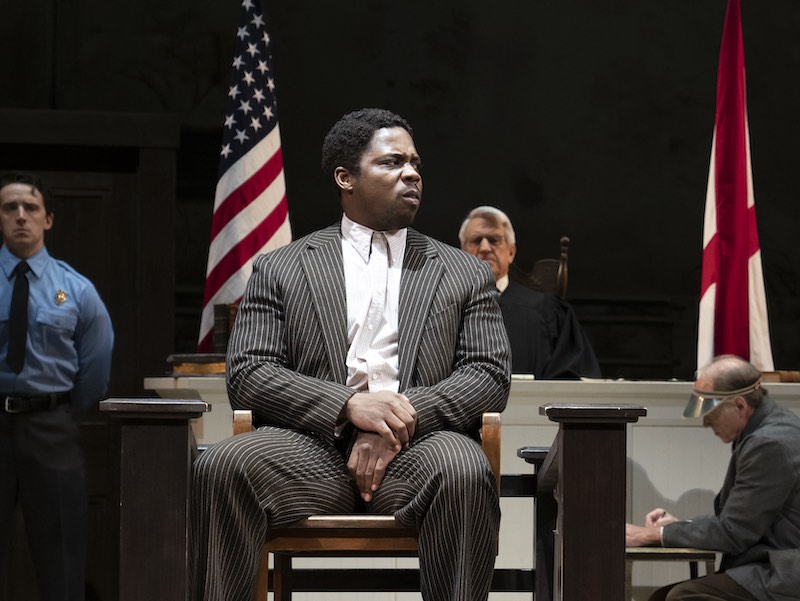
The story is set in 1934 in a fictional small town in the racist South, where an upstanding white lawyer named Atticus Finch (played earnestly by the estimable Richard Thomas) agrees to represent a Black man falsely accused of raping a white woman. The jury will be all white men, a conviction is predictable, but Atticus is convinced he has a solid case.
What Sorkin has done with Harper Lee’s novel is beyond adaptation. It is a metatheatrical resequencing and deconstruction of the story brilliantly conceived to tease out its ethical and political implications.
This is what theater has always done best, and Sorkin’s version epitomizes how enactment on stage can hold values up to view so that we can see more clearly how to live. My colleague Bob Ashby has parsed the public and political lessons in the play around race (‘To Kill a Mockingbird’ at Kennedy Center opens us to our political onus today). My focus is the play’s depiction of interpersonal ethics in the person of Atticus Finch.
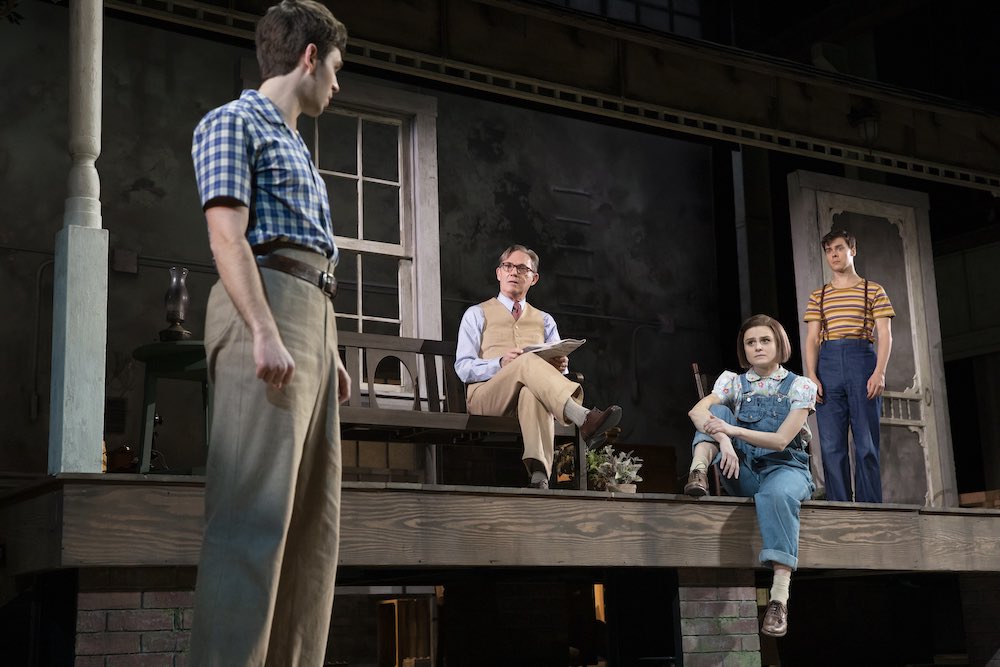
To unwrap the story and guide us through it, Sorkin has made Atticus’ daughter, Scout; her older brother, Jem; and their visiting friend Dill not only characters within it but also knowing narrators. Impressively performed by Melanie Moore (Scout), Justin Mark (Jem), and Steven Lee Johnson (Dill), they talk directly to us a lot and do so throughout the two acts. Hearing the mini-chorus of all three kids’ distinct points of view onstage expands the play’s universe of ideas exponentially.
That expansion begins in the very first scene when Scout reads to us from a local newspaper report that Bob Ewell died by falling on his own knife — which she knows to be a cover story. And as she tells us this, she cannot believe that her honest-to-a-fault father has espoused this pretty big lie — an ethical contradiction she cannot yet wrap her mind around.
That right there is one of those in medias res literary devices meant to intrigue but that might be a head-scratcher. Sorkin uses the device to introduce what will become his epic theme: Is consistency in one’s values always a virtue? What ought one do when exigencies call for an exception to rules-based principles? What if a higher ethical principle leads one to act contrary to conventions?
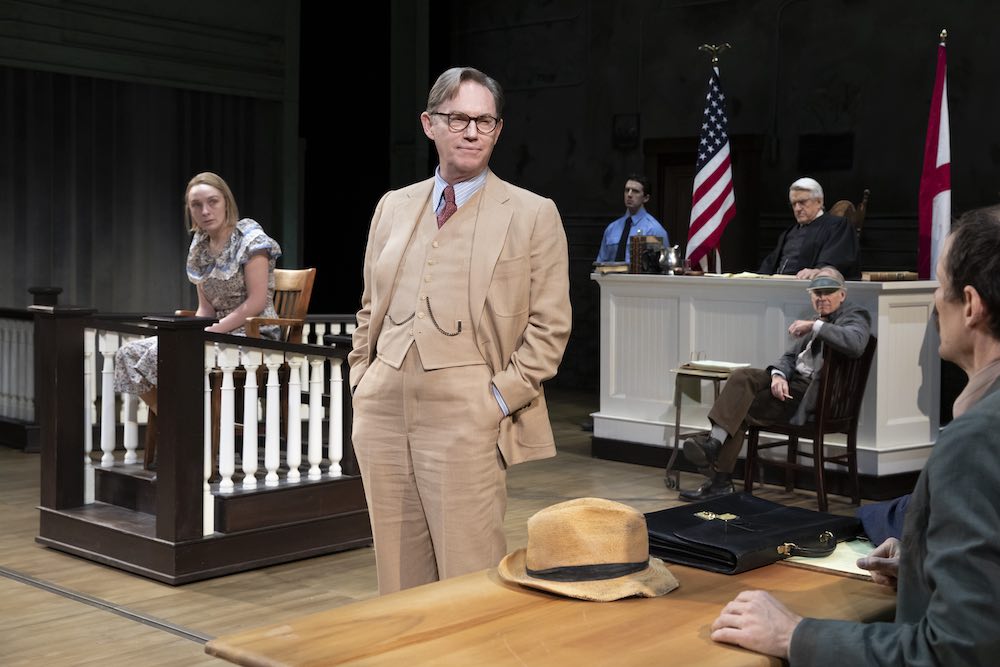
Sorkin quickly cuts to the trial where Atticus’ values get put to the test. Actors wheel in multiple set pieces that assemble balletically before our eyes into a courtroom peopled with judge, jury, and officers plus prosecution and defense. We hear the key witness testimonies in four knockout performances:
First up is Bob Ewell, the Klan-aligned father of the alleged rape victim. As scarily portrayed by Joey Collins, Bob Ewell is a sneering and snarling white-supremacist misogynist with a violent and villainous temper. (Spoiler alert: His death, when it comes, will be deserved.)
Throughout the trial, we see his daughter Mayella sitting and listening at the prosecution table in wretched distress. As heartbreakingly played by Arianna Gayle Stucki, Mayella enlists our pity even before she speaks. And when she takes the stand to testify, she bolts under Atticus’ questioning — “Who beat you up?” — dashing around the courtroom and wailing in a helpless hysteria of trauma.
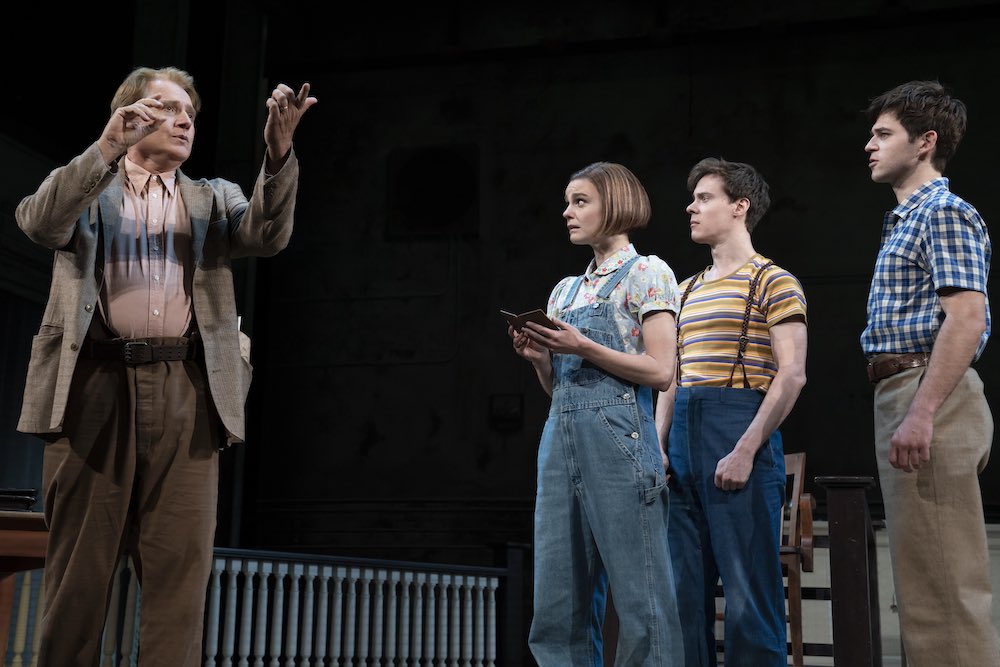
Atticus calls to the stand Link Deas, who testifies to a horrific workplace accident that happened to the accused. The witness’s vivid speeches, performed in ASL by the very compelling deaf actor Anthony Natale, are simultaneously spoken aloud by Scout, Jem, and Dill. The effect is stunning.
Last is the testimony of the defendant, Tom Robinson, played by Yaegel T. Welch, whose galvanizing performance is staggeringly powerful and surprisingly sensitive.
Sorkin soft-pedals the sentiment we associate with the film. His script is frequently very funny, and its humor connects the audience to the story’s conscience as Bernstein’s film score touched its heart. Throughout, Sorkin amplifies his theme of ethical self-reflection, holding it up to the audience’s inspection and introspection: What if you believe, as Atticus does, that “there’s goodness in everyone”— you just have to imagine being “inside their skin”? What if it’s not actually true that everyone is good? As Sorkin folds that theme into Lee’s shocking story of how Southern white racism convicted a wrongly accused Black man, and how a vicious town mob subsequently turned vigilante, the concepts of right and wrong, innocence and guilt, good people and bad, loom large.
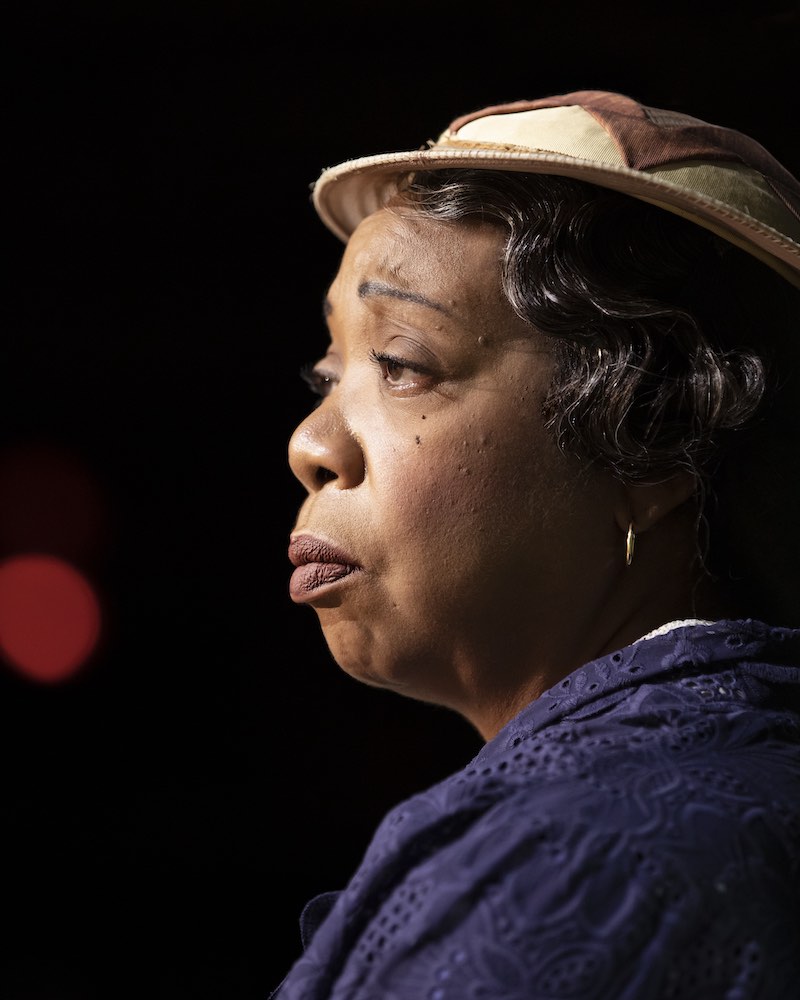
Calpurnia, the Finches’ Black housekeeper, played with warmth and awesome gravitas by Jacqueline Williams, has some of the funniest and most perceptive lines in the play. She too sees Atticus’ Achilles heel of ethical inconsistency. She too gives voice to the purpose of what is arguably the most important and profound play on stage today.
Running Time: Two hours 55 minutes, including one 15-minute intermission.
…
The 2022 program for To Kill a Mockingbird is online here.
COVID Safety: Masks are optional in all Kennedy Center spaces for visitors and staff. If you prefer to wear a mask, you are welcome to do so. See Kennedy Center’s complete COVID Safety Plan here.
*Elmer Bernstein’s theme for the movie version of To Kill a Mockingbird can be heard in this trailer for Aaron Sorkin’s stage adaptation (though it’s not in the play itself).
The national tour itinerary for To Kill a Mockingbird is here.




